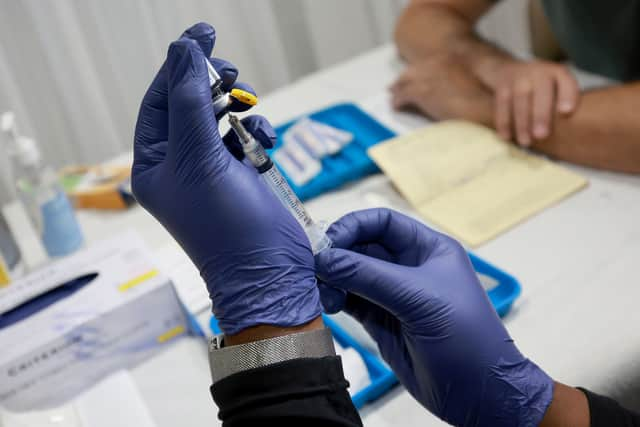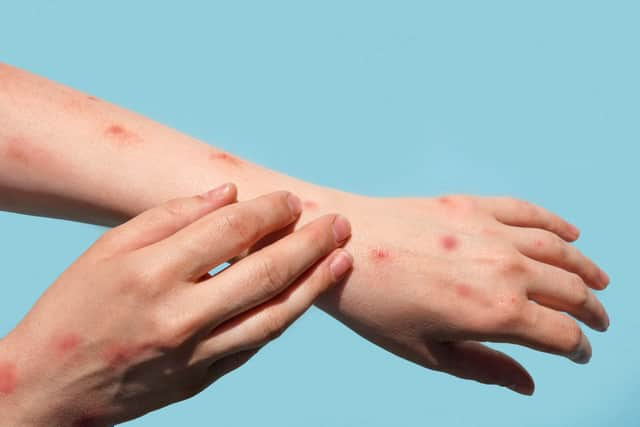Monkeypox: Nine London boroughs have virus highest case numbers in the UK - how many cases in my area?
and live on Freeview channel 276
Lambeth, Southwark, Tower Hamlets, Westminster, and Islington are the top five boroughs in the UK with the highest numbers of monkeypox cases, as the capital totals 1,864 infections.


Advertisement
Hide AdAdvertisement
Hide AdEach borough has more than 100 cases, while Lambeth has 283; Southwark has 198; Tower Hamlets has 133; Westminster has 121; and Islington has 105.
Camden, Hackney and the City of London, Wandsworth, and Hammersmith and Fulham make up the rest of the top nine.
While Brighton and Hove is the remaining UK top 10 area.
Loading....
A whopping 62% of UK-wide monkeypox cases are in London, the UK health security agency (UKHSA) found.
The London boroughs with the lowest virus rates are Havering, with just eight cases; Harrow, with 10; Hillingdon with 11; and Barking and Dagenham and Kingston upon Thames with 12.
Advertisement
Hide AdAdvertisement
Hide AdThe UK has a total of 2,914 confirmed cases, in addition to 103 highly probable infections, making a total of 3,017 incidents, of which 2,883 are in England.
What have health experts said?
The NHS is set to step up vaccination in London, as more supplies become available, while the World Health Organisation (WHO) has declared a “global emergency”.
Dr William Welfare, incident director at UKHSA, said: “While the most recent data suggests the growth of the outbreak has slowed, we continue to see new cases every day.


“While anyone can get monkeypox, the majority of UK cases continue to be gay, bisexual and men who have sex with men, with infection passed mainly through close contact.
Advertisement
Hide AdAdvertisement
Hide Ad“Pleasebe aware of symptoms, including rashes and blisters, particularly if you have recently had a new sexual partner.”
Where can I get a monkeypox vaccine near me in London?
Smallpox vaccines are used to inoculate against monkeypox, as the viruses are similar.
In London, there are more than 18 clinics offering vaccinations.
These include:
- Dean Street sexual health clinic: 56 Dean Street, London, W1D 6AE;
- Chelsea and Westminster Hospital: 369 Fulham Rd, Chelsea, SW10 9NH;
- Guy’s Hospital in Southwark: Great Maze Pond, Southwark, SE1 9RT;
- Mortimer Market Centre in Camden: Capper Street, London, WC1E 6JB;
- Barking Hospital Outpatient Centre East: Upney Lane, Barking, IG11 9LX;
- And Homerton sexual health services: Homerton Row, London, E9 6SR.
Who can get vaccinated against monkeypox?
People who are eligible for the vaccine are:
- Healthcare workers caring for and or due to start caring for monkeypox patients;
- Gay, bisexual and other men who have sex with men at highest risk of exposure.
- And people who have already had close contact with a confirmed monkeypox patient.
Your doctor or nurse will advise vaccination for you if they consider you are at high risk, and some sexual health services will contact men who are likely to be at higher risk first.
What are sexual health campaigners saying?
Advertisement
Hide AdAdvertisement
Hide AdThe Terrence Higgins Trust has urged the NHS and the UKHSA to pay more healthcare workers to administer vaccines, and wants the number of doses ordered to be doubled.
“There needs to be a [monkeypox] tsar charged with stopping this becoming endemic,” said Richard Angell, the campaigns director at the Terrence Higgins Trust.
“We can’t accept that it gets into the system like chlamydia.”
The British Association for Sexual Health and HIV has estimated at least 125,000 people will need vaccines, including gay men living with HIV, sex workers, and sexual health clinic staff.
What is the NHS saying?
Advertisement
Hide AdAdvertisement
Hide AdSteve Russell, NHS vaccination director, said: “The NHS is scaling up plans to get people vaccinated, particularly in London, thanks to the efforts of staff working hard to stop spread.
“Thousands more people will be invited very shortly with the number of clinics expanded too.
“We will be inviting anyone we believe is a priority for vaccination and local teams will work to make sure anyone who meets the criteria set by UKHSA knows how to get their jab.
“We ask people to wait to be contacted and to come forward at the earliest opportunity.”
What is the government saying?
Advertisement
Hide AdAdvertisement
Hide AdVaccines minister Maggie Throup said: “While we know monkeypox is usually mild and does not spread easily, we have procured more vaccines to further help control the outbreak.
“It is vital people stay alert and contact a sexual health clinic if they notice rashes or lesions.
“The NHS is already contacting those eligible for the vaccine, and I would urge people to take up the offer as soon as they are contacted.”
What is the mayor of London saying?
The mayor of London, Sadiq Khan said that we should all be worried about monkeypox.
Advertisement
Hide AdAdvertisement
Hide Ad“We’ve been lobbying the government to not just make sure there’s better public health advice, but also roll out more vaccines,” he told LondonWorld.
“There are certain people who are more prone to catch this virus. I would encourage anyone invited to receive a vaccine to take it up.”
What are the symptoms of monkeypox?
According to the NHS’s website, the symptoms of monkeypox are:
- A high temperature;
- A headache;
- Muscle aches;
- Backache;
- Swollen glands;
- Shivering (chills);
- Exhaustion.
A rash usually appears one to five days after the first symptoms, often beginning on the face, then spreading to other areas including the genitals and anus.
Advertisement
Hide AdAdvertisement
Hide AdIt starts as raised spots, then small fluid-filled blisters, before forming scabs which fall off.
Symptoms usually clear up in a few weeks and while symptomatic you can infect others.
What should you do if you come into contact with monkeypox?
Close contacts without symptoms won’t need to self-isolate.
Category two and three contacts should contact NHS 111 or a sexual health clinic if they develop a fever or other symptoms.
They should avoid skin to skin touch, such as hugging, kissing, sexual or intimate contact.
Contacts should avoid international travel, and inform health or dental staff before attending.
Avoid contact with children under five, pregnant women and those with impaired immunity.